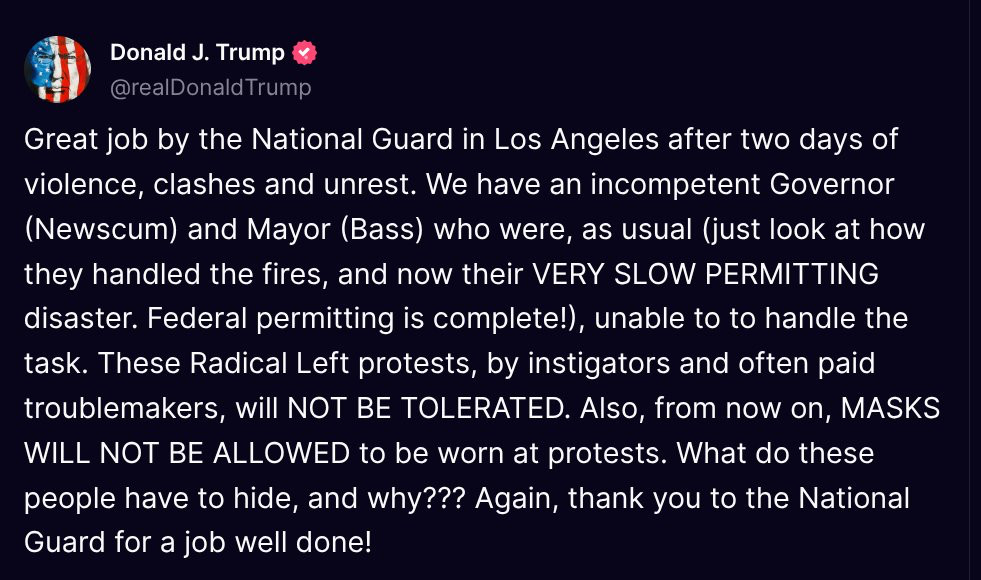I can’t say that Trump has thought out an end game in California. but if there were one, what would it be? Because, thinking or not, Trump is likely to go there eventually.
From what I can see from the other coast, the revolt against military occupation going on in Los Angeles is escalating. I would have advised the Angelenos to not react to the Guard at all. As Tom Nichols wrote in The Atlantic, Trump is using the Guard as bait.
By militarizing the situation in L.A., Trump is goading Americans more generally to take him on in the streets of their own cities, thus enabling his attacks on their constitutional freedoms. As I’ve listened to him and his advisers over the past several days, they seem almost eager for public violence that would justify the use of armed force against Americans.
He’s been eager for such a confrontation for awhile. I believe he wanted it in his first term, but then he had people around him who had the sense to say no. Now he’s got the likes of Pete Hegseth.
During the George Floyd protests in 2020, Trump was furious at what he saw as the fecklessness of military leaders determined to thwart his attempts to use deadly force against protesters. He’s learned his lesson: This time, he has installed a hapless sycophant at the Pentagon who is itching to execute the boss’s orders.
He thinks sending troops to put down lefties makes him cool. But there’s more to this than just confronting protesters. Trump has a beef with the whole state of California, remember.
Philip Bump writes in WaPo that Trump is going to war with California the same way he’s going to war with Harvard.
What’s important to remember about the fracture that emerged in Los Angeles over the weekend is that it came shortly after reports that President Donald Trump was seeking to block California from receiving certain federal funding. His team, The Post reported, was “asking federal employees to develop rationales for the funding cuts” — perhaps looking at conflicts with his executive orders about cutting costs or ending diversity initiatives.
California Gov. Gavin Newsom (D) responded by noting that the state contributes far more in federal taxes than it receives in services. But the point wasn’t really the money. The point was that the Trump administration wanted to bring California to heel, precisely as it had sought to bring elite universities to heel, similarly by contriving reasons the government might strip funding. The methodology was the same because the intent was the same: inflict pain on an entity that Trump viewed as hostile to his presidency.
So Trump wants to bring California “to heel.” What would that look like? What would make Trump happy with California? Whatever that is, I don’t think deploying some National Guard is going to make it happen. That’s just a first step.
I believe he wants escalation. And the escalation won’t stop with California. Because ultimately what Trump craves is to turn the nation and then the world into a perfect reflection of himself. He wants no disagreement with his beliefs, no doubts of his superior judgment of all things. And just as he wants control of Harvard — he’s seeking “input” into hiring, admissions, and eventually curriculum — he will want control of California and every other city or state he feels is a threat to his authority.. And the Constitution doesn’t give him that.
Robert Reich writes that we are witnessing the first stages of a Trump police state. At The Atlantic, David Frum goes even further.
If Trump can incite disturbances in blue states before the midterm elections, he can assert emergency powers to impose federal control over the voting process, which is to say his control. Or he might suspend voting until, in his opinion, order has been restored. Either way, blue-state seats could be rendered vacant for some time.
Trump hasn’t yet trotted out the Insurrection Act, which he wanted to use in his first term but got no cooperation from most of his staff. He could declare phony emergencies and insurrections everywhere there are majorities of Democratic voters and send in the troops.
And it wouldn’t completely surprise me if he were to try to revoke California’s statehood so that it reverts to being a federal territory. Then he can personally dismiss the entire state government and run the state any way he likes. That’s the only “end game” that would give Trump the victory he wants.
I doubt it’s possible for Trump to feel genuine contentment about anything. If you gave him absolute control over the galaxy he’d still crave more, because that craving is coming from a bottomless hole within himself. There is no filling it. That’s why he’s not going to stop until something stops him. Let’s hope that something involves the due process of law and the Constitution.
Update: Trump has added a Marine battalion to the National Guard in LA. The Guard in LA. haven’t been provided beds or food.
State troops sent to Los Angeles by the Trump administration, without the approval of California Gov. Gavin Newsom, were expected to sleep on floors or outdoors, a source told the Chronicle.
— San Francisco Chronicle (@sfchronicle.com) June 9, 2025 at 2:45 PM




